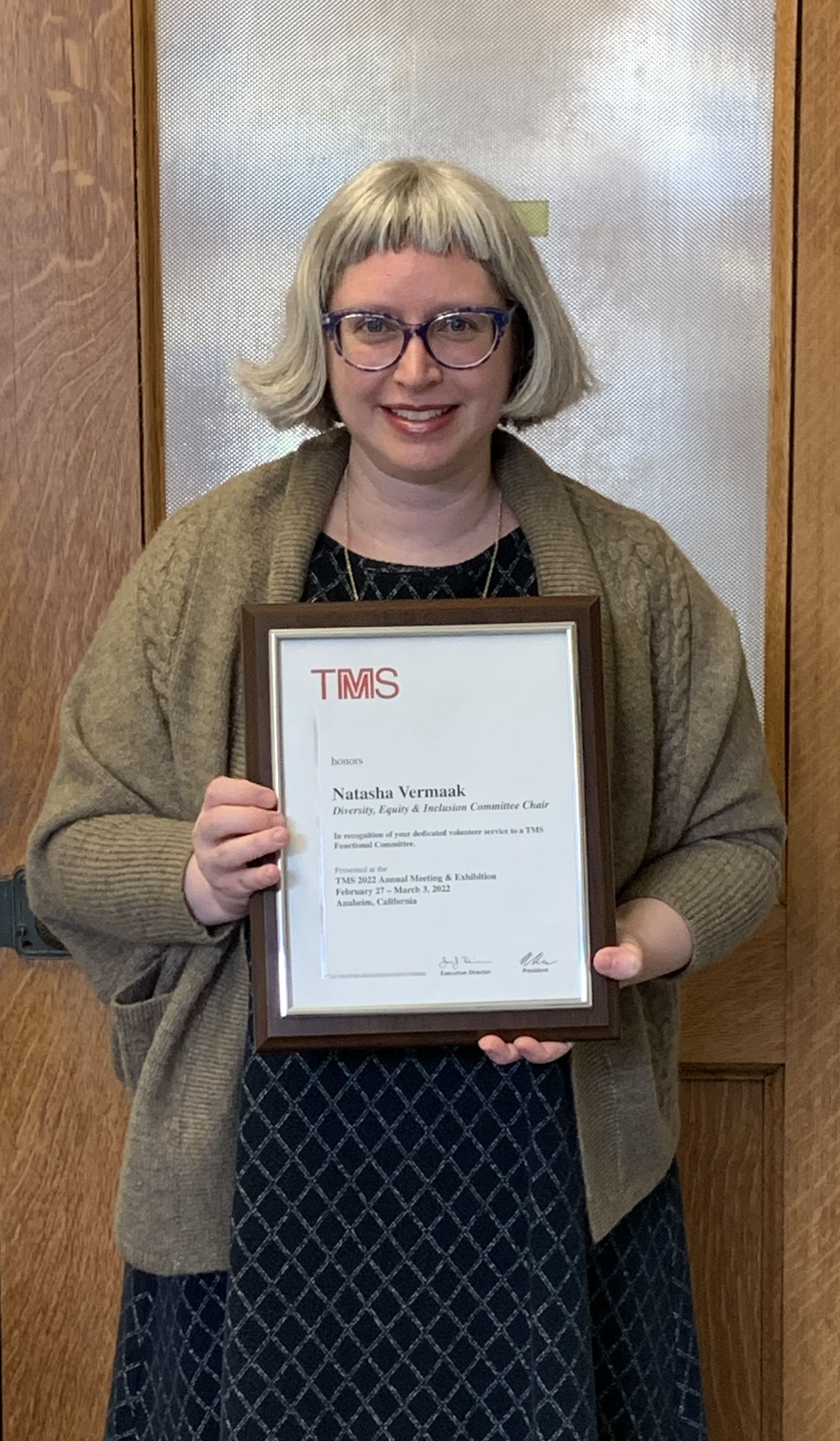In March 2022, MechE Prof. Natasha Vermaak was honored for her 2020-2022 leadership of the Diversity, Equity & Inclusion (DEI) Committee of TMS (The Minerals, Metals & Materials Society).
Throughout the past decade of Vermaak’s academic career, TMS has provided a base to grow, experiment and take risks, network, and give back through technical and functional committee service. Her early career engagement and leadership was recognized in 2016 and her Frontiers of Materials Research was recognized in 2020 through TMS awards.
The DEI Committee is dedicated to advancing TMS’s commitment to DEI through programs, initiatives, and activities that especially address the professional needs and aspirations of scientists and engineers who are underrepresented in the field.
Before serving as DEI Chair, Vermaak had taken on collaborative projects and roles increasing in scope within the committee. For example, she led a working group (2019-2020) to identify best practices and policies addressing the needs of TMS members with physical, sensory, or cognitive challenges, as well as an initiative (2016) to support diversity myth-busting through a digital quiz featured at an annual meeting. Below Vermaak reflects on some lessons learned and accomplishments from her tenure as TMS DEI chair.
What did you learn about leadership?
So much. First, the DEI committee is all volunteer-based. So, leading in this situation, I learned through observing past chairs, requires building a strong team environment and scaffolds of support that allow for and welcome the natural ebb and flow of volunteer member activity. I recognize that the success of the committee comes from the individual and collective passion of the members to take on challenges and get things done. My job was to foster the culture to support members’ ideas, remove barriers, and facilitate action and accountability.
I also learned that it is important to set your intentions and your agenda; time flies in responding to all the situations and opportunities that arise. I have been focusing on helping thread DEI more broadly and visibly through all of TMS, and helping to support everyone in doing the work. This informed the way that I engaged with technical committees, divisions, and the board, as well as in creating low-barrier opportunities for members to buy in and join DEI efforts (like the Wikipedia-Edit-A-Thon I describe below).
From a very practical standpoint, as an introvert, I learned that I feel most comfortable and effective running a large-scale, two-hour committee meeting if I have fully imagined scenarios for how it might go at a pretty granular level (e.g., down to presentation transitions) and prepare in advance for technical difficulties, timing challenges, etc. This also gets back to that support scaffolding and building in redundancies for flexibility.
What are you most proud of during your service?
Working with the people involved in the DEI Committee has been one of the most inspiring and rewarding things that I have been involved in personally and professionally. It is a big reason why I am involved in TMS, and the devotion that our community has to getting it right—even though we have a lot more work to do—keeps me here.
In 2020, as DEI Chair, I supported TMS leadership in developing two public statements and related actions: (i) regarding racial justice and the society’s commitment to take action by adding social justice for Black Americans, and underrepresented and underserved groups more broadly, to their official advocacy position when they engage with U.S. officials and elected representatives and (ii) a position statement publicly reaffirming the Society’s commitment to advancing racial and gender inclusivity in science and engineering and calling for the repeal of an Executive Order banning certain kinds of workplace diversity training. More about this work and impact can be found here.
I feel privileged to have been able to support, in any way, the efforts that our DEI working groups lead—including the new Asian/Pacific Islander Working Group, the Awards Nomination Working Group, the Race & Ethnicity Working Group’s Leadership Development Initiative, and TMS Pride, to name a few.
As a specific example, I’m proud of the multi-society event that I led for MS&T 2021—the inaugural Wikipedia Edit-A-Thon for Diversity in Materials Science and Engineering. I worked together with a team of representatives from the three member-societies involved in MS&T (TMS, ACerS, and AIST) and secured collaboration with STEM Wikithon veterans, the organization 500 Women Scientists. Wikipedia is the fifth most popular website in the world, with more than 32 million views a day. However, the contributions of the broad diversity of materials scientists and engineers are often buried or overlooked on Wikipedia resources. This Wikipedia Edit-A-Thon event aimed to help combat systemic biases and make the achievements of underrepresented materials scientists and engineers more readily discoverable to the world. A month after the event, the 3.85K+ words added by all of the participants had already been viewed over 1,000 times. This inaugural event has laid the foundation for continued engagement and repeat collaborative Wikithons.
What are you looking forward to with the TMS DEI Committee?
Most immediately, I’m excited to support the new leadership transition to Dr. Jenifer Locke and Dr. Clinique Brundidge. I benefited tremendously from mentorship, support, and guidance from my past-chair, Dr. Megan Cordill, vice-chair Dr. Jessica Krogstad, and TMS support staff, and I hope to be of similar service. I’m looking forward to continuing to grow the impact of the DEI working groups and facilitate the creation of new ones. I always look forward to the TMS Diversity Summits, like the most recent one, DMMM4, from lead organizer Dr. Aeriel D. M. Leonard. I envision a lifelong engagement with TMS DEI, and I am grateful to share this journey with so many inspiring colleagues.

